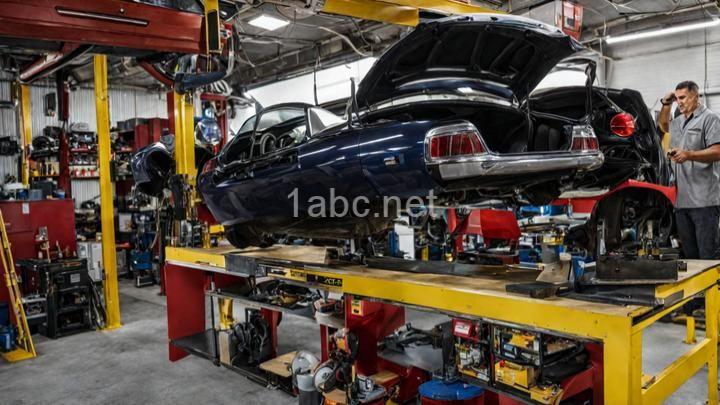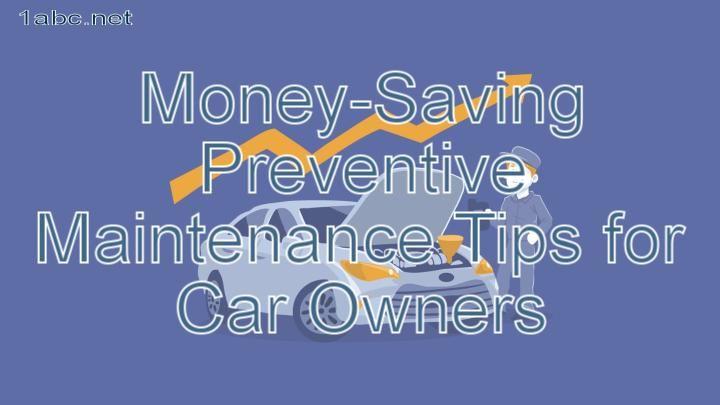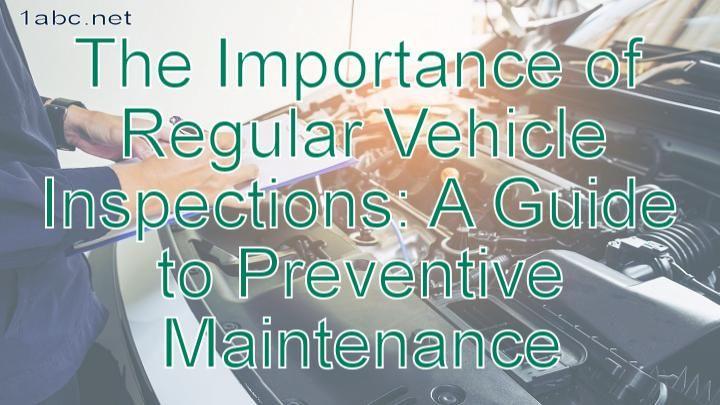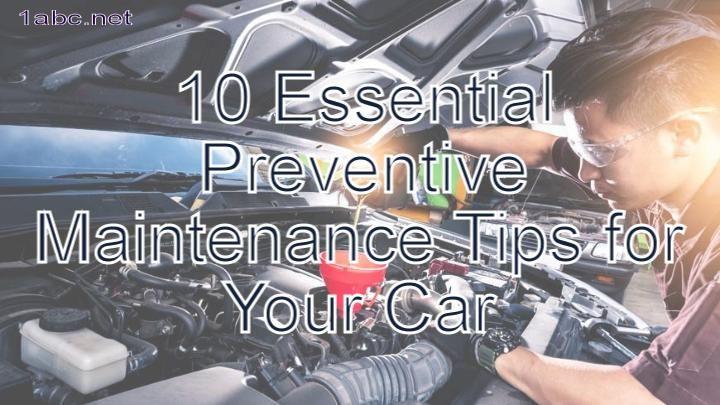Common Car Maintenance Myths Debunked
Introduction:
I. Myth 1: You should change your oil every 3,000 miles.
II. Myth 2: Premium fuel improves performance in all cars.
III. Myth 3: Idling your car helps warm up the engine.
IV. Myth 4: Washing your car with dish soap is safe and effective.
V. Myth 5: All tires need to be replaced at once.
VI.
Conclusion:

Introduction:
Welcome to our blog post on common car maintenance myths! We understand that taking care of your car can be overwhelming, especially with all the information out there. That's why we're here to debunk some of the most prevalent myths and provide you with accurate information to help you maintain your vehicle effectively. So, let's dive in and separate fact from fiction!
I. Myth 1: You should change your oil every 3,000 miles.
One of the most common misconceptions about car maintenance is the belief that you need to change your oil every 3,000 miles. While this used to be true in the past, advancements in engine oil technology have extended the lifespan of oil significantly.
Modern engine oils, such as synthetic blends and full synthetics, are designed to provide better protection and last longer. In fact, most car manufacturers now recommend oil changes every 5,000 to 7,500 miles, depending on the type of oil and driving conditions.
Following the manufacturer's recommendations is crucial because they take into account factors such as the type of engine, driving habits, and climate. So, be sure to consult your vehicle's owner's manual or speak with a qualified mechanic to determine the optimal oil change interval for your specific car.
II. Myth 2: Premium fuel improves performance in all cars.
Many people believe that using premium fuel will instantly enhance their car's performance. However, this myth is not entirely accurate. The difference between regular and premium gas lies in their octane ratings.
Octane is the measure of a fuel's resistance to detonation, or "knocking." Premium fuel has a higher octane rating, typically around 91 or 93, compared to regular gasoline with an octane rating of 87. High-performance engines with higher compression ratios require premium fuel to prevent knocking and maximize performance.
On the other hand, most standard vehicles are designed to run perfectly fine on regular gasoline. Using premium fuel in these cars offers no additional benefits and is simply a waste of money. So, unless your vehicle's manufacturer specifically recommends premium fuel, stick to regular gasoline for your everyday driving needs.
III. Myth 3: Idling your car helps warm up the engine.
It's a common belief that idling your car for several minutes before driving helps warm up the engine and allows it to perform optimally. However, this myth is not applicable to modern engines.
Today's engines are designed with advanced engineering and materials that allow them to warm up quickly while driving. Idling for an extended period not only wastes fuel but also contributes to unnecessary wear and tear on the engine.
Instead of idling, a better practice is to drive gently for the first few minutes after starting your car. This helps circulate oil throughout the engine, allowing it to reach its optimal operating temperature more efficiently. So, the next time you start your car, skip the idle time and hit the road gently.
IV. Myth 4: Washing your car with dish soap is safe and effective.
When it comes to washing your car, using dish soap is a common misconception. While it may seem like a convenient and cost-effective option, dish soap can be harmful to your car's paintwork.
Dish soap is designed to remove oil and grease, which makes it effective for cleaning dishes but not suitable for washing cars. It can strip away the protective wax and leave your car's paint vulnerable to damage from UV rays, environmental contaminants, and harsh weather conditions.
To properly wash your car, it's best to use cleaning products specifically formulated for automotive use. Look for pH-balanced, non-abrasive car wash soaps that are gentle on your car's paintwork. Additionally, use microfiber towels or a soft sponge to avoid scratching the surface.
Proper car washing techniques also play a crucial role in maintaining your vehicle's appearance. Start by rinsing your car thoroughly to remove loose dirt and debris. Then, wash it section by section, starting from the top and working your way down. Finally, rinse off the soap and dry your car with a clean microfiber towel or a chamois to prevent water spots.
V. Myth 5: All tires need to be replaced at once.
There is a common misconception that all four tires need to be replaced simultaneously. While it's ideal to have a full set of matching tires for optimal performance and safety, it's not always necessary.
Tire replacement depends on various factors, including tread wear, age, and damage. Regular tire inspections and rotations are key to ensuring even wear and prolonging the life of your tires. During these inspections, pay attention to the tread depth indicators, which are small rubber bars built into the tire grooves. If the tread depth reaches these indicators, it's time to consider replacing the tire.
Additionally, keep an eye out for signs of tire wear, such as uneven tread wear, excessive sidewall cracking, or bulges. These may indicate a need for immediate tire replacement.
Remember that tires play a crucial role in your car's handling, traction, and overall safety. So, if you're unsure about the condition of your tires or when to replace them, consult a trusted tire professional who can assess your tires and provide expert advice.
VI.
Conclusion:
We've now debunked some of the most common car maintenance myths, providing you with accurate information to help you take better care of your vehicle. It's important to rely on accurate information from reputable sources and consult professionals when in doubt.
Maintaining your car doesn't have to be overwhelming. By following the manufacturer's recommendations, using the right products, and adopting proper maintenance practices, you can keep your car running smoothly and efficiently for years to come.
Remember, knowledge is power when it comes to car maintenance. So, stay informed, ask questions, and take pride in maintaining your vehicle. Happy driving!
FREQUENTLY ASKED QUESTIONS
Is it necessary to change my car's oil every 3,000 miles?
The recommendation to change a car's oil every 3,000 miles is a common guideline that used to be widely followed. However, with improvements in engine and oil technology, the interval between oil changes can often be extended. Many newer vehicles now have longer oil change intervals, typically ranging from 5,000 to 10,000 miles.
To determine the appropriate oil change interval for your car, it's best to consult the owner's manual provided by the manufacturer. The manual will outline the specific recommendations for maintaining your vehicle, including how often to change the oil. Following the manufacturer's guidelines will ensure that your car continues to operate optimally and that the warranty requirements are met.
Ultimately, the frequency of oil changes depends on several factors, including your driving conditions, the age and type of your vehicle, and the type of oil you use. It's always a good idea to monitor your oil level and quality regularly, and have the oil changed promptly whenever it appears dirty or low.
Should I warm up my car before driving in cold weather?
It is generally not necessary to warm up your car for an extended period of time before driving in cold weather. In modern cars, the engine warms up more quickly when you drive it. However, it can be beneficial to let your car idle for a brief period (about 30 seconds to a minute) to allow the oil to circulate before you start driving. This helps ensure proper lubrication of the engine components. Additionally, it is important to clear your car's windows and mirrors of any ice or snow before driving for clear visibility.
Can I use dish soap to wash my car?
Using dish soap to wash your car is not recommended. While dish soap is effective at cutting through grease and grime, it can be too harsh for your car's paintwork. Dish soap is designed to remove oils and wax, which can strip away the protective layer of wax on your car's paint, leading to dullness and potential damage. It's best to use car wash soap specifically formulated for automobiles, as it is gentler on the paint and maintains the protective coating.
Do I need to replace all four tires at once?
Whether you need to replace all four tires at once depends on a few factors.
Firstly, it is generally recommended to replace tires in sets of two or four to maintain balanced handling and traction. This is especially important for all-wheel drive vehicles, as mismatched tires can cause damage to the drivetrain.
Secondly, if your tires are worn out and have reached the minimum tread depth, it is advisable to replace all four tires to ensure optimal performance and safety.
However, if your tires still have sufficient tread and are in good condition, it is not mandatory to replace all four at once. In such cases, you can replace only the tires that are damaged or worn.
For accurate guidance on tire replacement, it is always a good idea to consult with a professional tire technician or refer to the manufacturer's recommendations for your specific vehicle.




